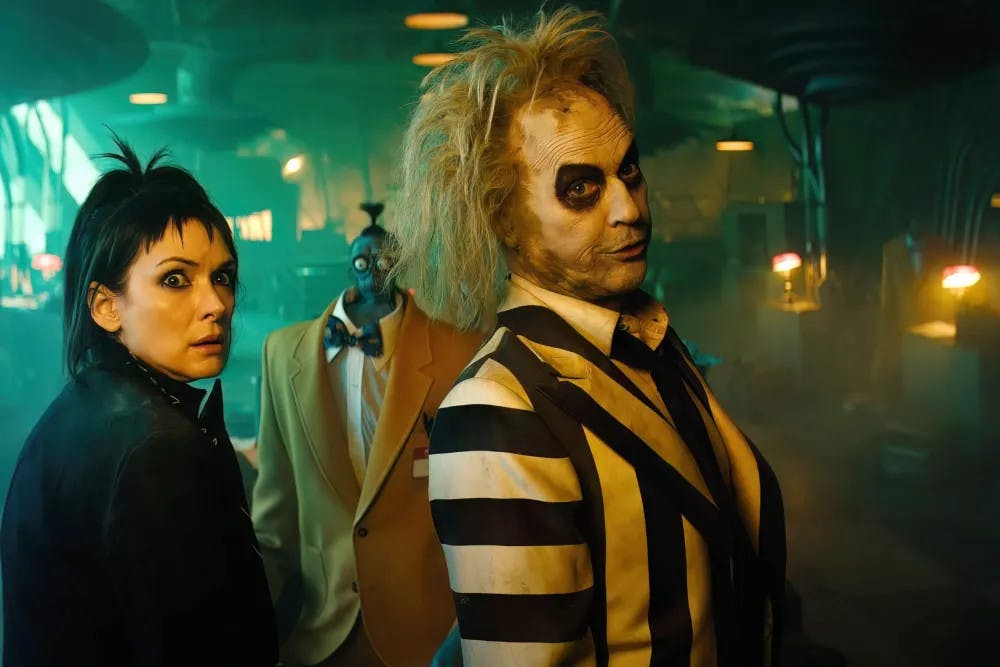Review: ‘Beetlejuice Beetlejuice’ doesn’t quite resurrect the dead

Review: ★★½
The legacy sequel has been a mainstay for Hollywood for almost 15 years (“Tron: Legacy,” anyone?), and it has proven to be a winning formula. Ever since the seventh “Star Wars” installment made a whopping $2 billion, every possible franchise has been resurrected from the dead to recapture profits.
Each new lega-sequel always inspires mixed emotions because of both the low-lows found within the subgenre (the “Indiana Jones” sequels) and the high-highs (the “Mad Max” sequels). But “Beetlejuice Beetlejuice” has a lot going for it that other lega-sequels do not.
Tim Burton, the director of the original “Beetlejuice” returns, giving the film the same creative engine that drove the original. Furthermore, the principal cast was almost entirely available — Winona Ryder, Michael Keaton and Catherine O’Hara are all back, reprising their iconic roles.
However, “Beetlejuice Beetlejuice” frequently felt unfocused, as the film bites off more than it can chew in an attempt to be a satisfying legacy sequel and an innovative horror picture.
This lack of focus is obvious when comparing “Beetlejuice Beetlejuice” with the original film. The ingenuity of the original “Beetlejuice” is how simple it is — two recently deceased ghosts want to get an obnoxious rich family out of their house and explore the surprisingly bureaucratic underworld to do so.
But “Beetlejuice Beetlejuice” is remarkably complex for a follow-up: the film follows Lydia Deetz (Winona Ryder) from the original, and explores her relationships with her estranged daughter, her deceased husband and her new fiancée. On top of that, the film also portrays Betelgeuse (Michael Keaton) as a main character, conveying his relationship with his ghoulish ex-wife (Monica Bellucci). Each of these threads could be their own film in the same vein as the 1984 original, but instead, they are all woven together to a middling effect.
By attempting to balance so many different things, the film is forced to waste time on exposition instead of focusing on the film’s principal strength: its creativity. The original “Beetlejuice” makes the basic premise an excuse to explore a visually inspired underworld, whereas “Beetlejuice Beetlejuice” feels too distracted by its own plotting and various characters to fully dive into its new visual accomplishments.
When the film is in the afterlife, it’s very fun — there are lots of great practical effects that feel refreshing against the CGI hellscape that dominates most other Hollywood films of the moment. But this part of the movie is fighting against the audience’s boredom created by the overstuffed and trope-y plot.
Ultimately, though, this conflict is not damning for the film, as Michael Keaton is as exhilarating as ever in the role of the sorta-titular Betelgeuse. His Looney-Tunes delivery and mannerisms make him a welcome presence on screen in the face of a rather lackluster plot, and his presence is what will likely win over much of the film’s audience. A beat hasn’t been missed since 1984, which is refreshing in a subgenre that often completely fails to recapture the original appeals of the revitalized IP.
But at the same time, Betelgeuse’s presence is another manifestation of the film’s overcrowded nature. The original “Beetlejuice” knows precisely when to use him for comic relief, whereas this film needs to make the character a complete co-star. Rather than starting small and expanding, the film feels the need for everything to be explained and everyone to be characterized. Keaton’s performance feels a lot less electrifying when it is constantly happening — once you get the idea, you are forced to look past the raw creativity and into the unoriginal plotting.
The philosophy that drives this overuse is also present in the other returning characters — Catherine O’Hara and Winona Ryder give good performances and feel like the original characters, but many of the subtle jabs from the original film have been replaced with absurdity, making these characters feel like parodies rather than continuations.
There’s enough shining through for me to half-recommend “Beetlejuice Beetlejuice” — the creativity is delightful, the performances are good and it’s generally a fun time at the movies, something that cannot be said for many lega-sequels. But the film completely ignores the structure of the original in favor of something grander, which makes it feel distracted by tropes rather than ingenious. Thankfully, the film does not take itself seriously, which makes everything a lot more fun, but once you understand the film’s tricks, there isn’t all that much to take away.
More from The Rice Thresher

Andrew Thomas Huang puts visuals and identity to song
Houston is welcoming the Grammy-nominated figure behind the music videos of Björk and FKA twigs on June 27.

Live it up this summer with these Houston shows
Staying in Houston this summer and wondering how to make the most of your time? Fortunately, you're in luck, there's no shortage of amazing shows and performances happening around the city. From live music to ballet and everything in between, here are some events coming up this month and next!

Review: 'Adults' couldn’t have matured better
Sitcoms are back, and they’re actually funny. FX’s “Adults” is an original comedy following a friend group navigating New York and what it means to be an “actual adult.” From ever-mounting medical bills to chaotic dinner parties, the group attempts to tackle this new stage of life together, only to be met with varying levels of success.

Please note All comments are eligible for publication by The Rice Thresher.